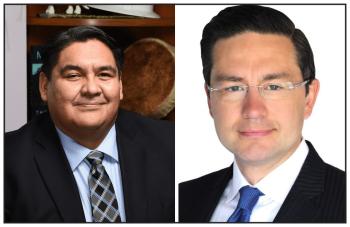Image Caption
Local Journalism Initiative Reporter
Windspeaker.com
Stephen Buffalo, president of the Indian Resource Council-Canada (IRC), knows that First Nations are not getting what they’re due when it comes to benefitting from resource development on their land.
He doesn’t know, yet, if federal Conservative leader Pierre Poilievre’s recent announcement of pursuing a “new model for First Nations that they could opt into giving them more direct fiscal revenues from resource projects on their lands” is the answer.
But First Nations are not thriving under the Indian Act and Poilievre’s approach is “something different,” Buffalo said.
The IRC was established in 1985 by chiefs representing oil and gas producing First Nations primarily in western Canada. Among the organization’s mandate is to support First Nations in their efforts to attain greater control of their oil and natural gas resources.
In one of Poilievre’s first initiatives to address First Nations since becoming party leader last September, Poilievre championed a proposal put forward by the First Nations Tax Commission (FNTC), as well as the work undertaken by FNTC commissioner Manny Jules.
Poilievre called FNTC’s resource charge a “grassroots First Nations solution to an Ottawa-made problem.”
According to FNTC’s 2020/21 annual report, the First Nation resource charge (FNRC) would allow First Nations to “derive a fiscal benefit from charges on resource projects they support in their ancestral lands…(and) would provide an important contribution to First Nations revenues…”
Further, said the FNTC, “Provincial governments are particularly supportive of a proposed federal tax credit that resource companies could use to offset their payment of the FNRC to First Nations.”
“Too much of the fiscal revenue from resource projects done on First Nations land still goes to the federal government and too little goes to the First Nations themselves,” said Poilievre in Vancouver on Jan. 24.
Economic impact benefits signed by individual First Nations with development companies are “ad hoc” and unreliable, he said.
Poilievre said he would be employing his shadow cabinet to embark on country-wide consultations on the FNRC proposal. Among the principles to be discussed would include “ceding tax room,” which he said meant redirecting revenues from the federal government to First Nations governments.
“That would make sure that the projects are actually economical; that they would actually happen,” said Poilievre.
He added that the scheme would not impact provincial taxes or royalties, and although he could not direct provinces on what to do, he would encourage them to match or build upon the First Nations resource charge and offer something similar in addition to it.
Poilievre said if First Nations opted into the resource charge, that would not stop them from demanding other economic and social benefits from resource projects, such as training, job opportunities and setting conditions that would protect the environment.
“What we need to do is get the Ottawa gatekeepers out of the way. Put First Nations in control of their money and let them bring home the benefits that are duly theirs and have been deprived them for too long,” said Poilievre.
Poilievre’s announcement took Buffalo by surprise.
“I had no idea he was going to do that. (The IRC has) been advocating to look at a possible formula like that…because First Nations under the Indian Act…it’s just not working for people. The more we live it, the more we struggle,” said Buffalo.
Buffalo is not familiar with FNTC’s proposal.
“I’m unfamiliar with that charge. But if someone thought of it from the First Nation side, it’s probably definitely a model worth investigating. There’s got to be mechanisms in place such as that for industry, and probably provincial and municipal governments to acknowledge,” he said.
Buffalo likens Poilievre’s proposal to resource revenue sharing.
“Having a resource revenue sharing model is definitely something we should consider in asserting our own jurisdiction,” said Buffalo.
He points to former Alberta Premier Jason Kenney’s contention that equalization payments should be done away with. Equalization payments see provincial tax dollars collected by the federal government and distributed to “have-not” provinces allowing them to administer provincial programs. Alberta’s resource rich economy saw the province contribute $2.9 billion in 2021, according to the Canadian Taxpayers Federation.
"And there's a small little piece, a portion there for the 644 First Nations in Canada to utilize under the Indian Act," said Buffalo.
He adds that funding from the federal government falls well short when it comes to infrastructure needs for First Nations, as well as social, educational, family and health programming needs.
“We’re trying to fix a problem when there’s not enough money to fix anything,” said Buffalo. “Resource revenue sharing is probably the best because Canada is vast and rich in resources.”
As for Poilievre’s promise of consulting with First Nations, Buffalo is pleased, particularly if that means they’ll be coming to First Nation communities and not expecting leadership and technicians to travel to cities for meetings.
Buffalo believes that the majority of the Conservative 71-member shadow cabinet will need educating about First Nations culture, customs and traditions, but says that can come later.
“It’s a lot of history that the government needs to learn… but in the immediate (time), we’ve got to be able to find the mechanisms to help us address some of the issues that are plaguing our communities,” he said.
Poilievre was unclear as to where and when those consultations on the First Nations resource charge would take place.
Manny Jules, commissioner of the First Nations Tax Commission, did not respond to multiple requests from Windspeaker.com for an interview on Poilievre’s endorsement of the First Nations resource charge concept.
Local Journalism Initiative Reporters are supported by a financial contribution made by the Government of Canada.

